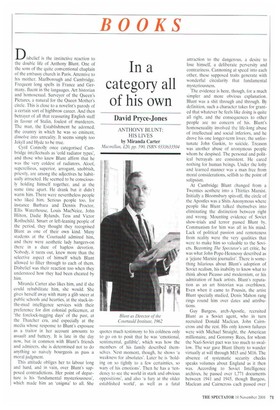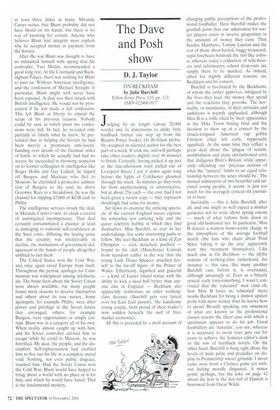In a category all of his own
David Pryce-Jones
ANTHONY BLUNT: HIS LIVES by Miranda Carter Macmillan, £20, pp. 590, ISBN 0333633504 Disbelief is the instinctive reaction to the double life of Anthony Blunt. One of the sons of the quite conventional chaplain of the embassy church in Paris. Attentive to his mother. Marlborough and Cambridge. Frequent long spells in France and Germany, fluent in the languages. Art historian and homosexual. Surveyor of the Queen's Pictures, a natural for the Queen Mother's circle. This is close to a novelist's parody of a certain sort of highbrow career. And then betrayer of all that reassuring English stuff in favour of Stalin, foulest of murderers. The man, the Establishment he adorned, the country in which he was so eminent, dissolve into unreality. It seems simply too Jekyll and Hyde to be true.
Cyril Connolly once categorised Cambridge intellectuals as 'cold radiator types', and those who knew Blunt affirm that he was the very coldest of radiators. Aloof, supercilious, superior, arrogant, snobbish, priestly, are among the adjectives he habitually attracted. He seemed to be consciously holding himself together, and at the same time apart. He drank but it didn't warm him. There were nevertheless people who liked him, Serious people too, for instance Barbara and Dennis Proctor, Ellis Waterhouse, Louis MacNeice, John Hilton, Dadie Rylands, Tess and Victor Rothschild. Smart or left-leaning people of the period, they thought they recognised Blunt as one of their own kind. Many students at the Courtauld admired him, and there were aesthetic lady hangers-on there in a daze of hapless devotion. Nobody, it turns out, knew more than the selective aspect of himself which Blunt allowed to filter through to each of them. Disbelief was their reaction too when they understood how they had been cheated by him.
Miranda Carter also likes him, and if she could rehabilitate him, she would. She gives herself away with many a glib sneer at public schools and hearties, at the stuck-inthe-mud intelligence services with their preference for dim colonial policemen, at 'the forelock-tugging days' of the past, at the Thatcher era, and especially at the media whose response to Blunt's exposure as a traitor in her account amounts to assault and battery. It is late in the day now, but in common with Blunt's friends and admirers, she is determined not to do anything so naively bourgeois as pass a moral judgment.
This attitude obliges her to labour long and hard, and in vain, over Blunt's supposed contradictions. Her point of departure is his 'fundamental mysteriousness', which made him an 'enigma' to all. She quotes much testimony to his coldness only to go on to posit that he was 'emotional, sentimental, gullible', which was how the members of his family described themselves. Next moment, though, he shows 'a weakness for absolutes'. Later he is 'holding on so tightly to a few certainties, so wary of his emotions'. Then he has a 'tendency to see the world in stark and obvious oppositions', and also 'a fury at the older established world', as well as a fatal attraction to the dangerous, a desire to lose himself, a deliberate perversity and contrariness. Cannoning at speed into each other, these supposed traits generate with wonderful circularity that fundamental mysteriousness.
The evidence is here, though, for a much simpler and more obvious explanation. Blunt was a shit through and through. By definition, such a character takes for granted that whatever he feels like doing is quite all right, and the consequences to other people are no concern of his. Blunt's homosexuality involved the life-long abuse of intellectual and social inferiors, and he drove his one longer-term lover, the unfortunate John Gaskin, to suicide. Treason was another abuse of anonymous people whom he despised. The personal and political betrayals are consistent. He cared nothing for human beings. Under the lofty and learned manner was a man free from moral considerations, selfish to the point of solipsism.
At Cambridge Blunt changed from a Twenties aesthete into a Thirties Marxist. Initially a Bloomsbury spin-off, the circle of the Apostles was a Shits Anonymous where people like Blunt talked themselves into eliminating the distinction between right and wrong. Mounting evidence of Soviet show-trials and terror passed Blunt by. Communism for him was all in his mind. Lack of political passion and remoteness from reality were the very qualities that were to make him so valuable to the Soviets. Becoming The Spectator's art critic, he was what John Pope-Hennessy described as a 'jejune Marxist journalist'. There is something hilarious about Blunt's adoption of Soviet realism, his inability to know what to think about Picasso and modernism, or his admiration of hack artists, Blunt's reputation as an art historian was overblown. Even when it came to Poussin, the artist Blunt specially studied, Denis Mahon rang rings round him over dates and attributions.
Guy Burgess, arch-Apostle, recruited Blunt as a Soviet agent, who in turn recruited Donald Maclean, John Cairncross and the rest. His only known failures were with Michael Straight, the American millionaire, and Goronwy Rees, for whom the Nazi-Soviet pact was too much to swallow. The war gave Blunt liberty to wander virtually at will through M15 and M16. The absence of systematic security checks speaks volumes about England as it then was. According to Soviet Intelligence archives, he passed over 1,771 documents between 1941 and 1945, though Burgess, Maclean and Cairncross each passed over at least three times as many. Miranda Carter writes that Blunt probably did not have blood on his hands, but there is no way of knowing for certain. Anyone who believes Blunt had integrity must explain why he accepted money as payment from the Soviets.
After the war Blunt was thought to have so exhausted himself with spying that his controller, Yuri Modin, recommended a good long rest. At the Courtauld and Buckingham Palace, there was nothing for Blunt to pass on. Without American intelligence, and the confession of Michael Straight in particular, Blunt might well never have been exposed. A deal was then struck with British intelligence. He would not be prosecuted if he too made a full confession This left Blunt at liberty to extend the scope of his previous treason. Nobody could be sure at which point his confessions were full. In fact, he revealed only partially or falsely what he knew; he pretended that in helping the Soviets he had been merely a 'premature anti-fascist' handing over details of the German order of battle to which he actually had had no access; he succeeded in throwing suspicion on to former colleagues in intelligence like Roger Hollis and Guy Liddell; he tipped off Burgess and Maclean, who fled to Moscow; he cherished a protective admiration of Burgess to the end; he drove Goronwy Rees to a breakdown; he was the channel for slipping £5,000 of KGB cash to Philby.
The intelligence services struck the deal, in Miranda Carter's view, to cloak a record of unmitigated incompetence. That deal certainly consummated a disaster at least as damaging to national self-confidence as the Suez crisis, diffusing the lasting sense that the country was irretrievably in decline, the institutions of government deliquescent in the hands of people altogether unfitted to run them, The United States won the Cold War, and once again saved Europe from itself. Throughout the period, apologia for Communism was widespread among intellectuals. The brute facts about the Soviet Union were always available, but many people found many reasons to deceive themselves and others about its true nature. Some apologists, for example Philby, were after power and privilege in the Soviet future they envisaged; others, for example Burgess, were opportunists or simply corrupt. Blunt was in a category all of his own. When reality almost caught up with him, and his Soviet controller advised him to escape while he could to Moscow, he was horrified. My dear, the people, and the discomfort. Self-righteousness had enabled him to live out his life in a complete moral void. Nothing, not even public disgrace, touched him. Had the Soviet Union won the Cold War, Blunt would have helped to bring about a world with no place in it for him, and which he would have hated. That is the fundamental mystery.















































































































 Previous page
Previous page